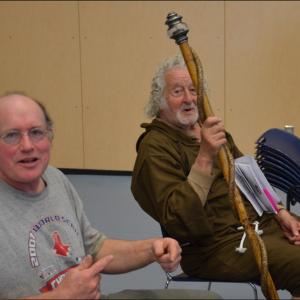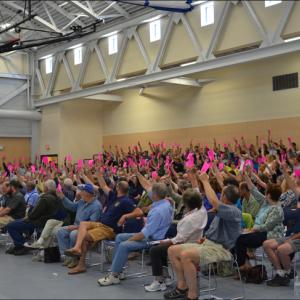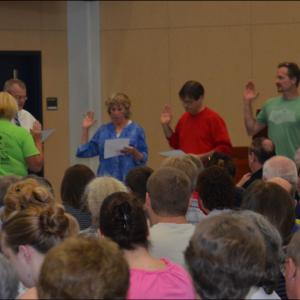Lincolnville spends long day together, dissolves police force, cuts EMS funding
 Lincolnville citizens use hot pink cards Saturday to indicate whether they wanted to keep its police department intact for $85,557. Ultimately, opposition to a local police force prevailed and the police chief's job eliminated. Police Chief Ron Young will remain on the job until the end of this month, per his contract. (Photo by Lynda Clancy)
Lincolnville citizens use hot pink cards Saturday to indicate whether they wanted to keep its police department intact for $85,557. Ultimately, opposition to a local police force prevailed and the police chief's job eliminated. Police Chief Ron Young will remain on the job until the end of this month, per his contract. (Photo by Lynda Clancy)
 Town Administrator David Kinney counts pink cards. (Photo by Lynda Clancy)
Town Administrator David Kinney counts pink cards. (Photo by Lynda Clancy)
 Lincolnville resident MaryAnne Mercier casts her ballot into the box.
Lincolnville resident MaryAnne Mercier casts her ballot into the box.
 Lincolnville residents Mike Ray and Richard Rosenberg. (Photo by Lynda Clancy)
Lincolnville residents Mike Ray and Richard Rosenberg. (Photo by Lynda Clancy)
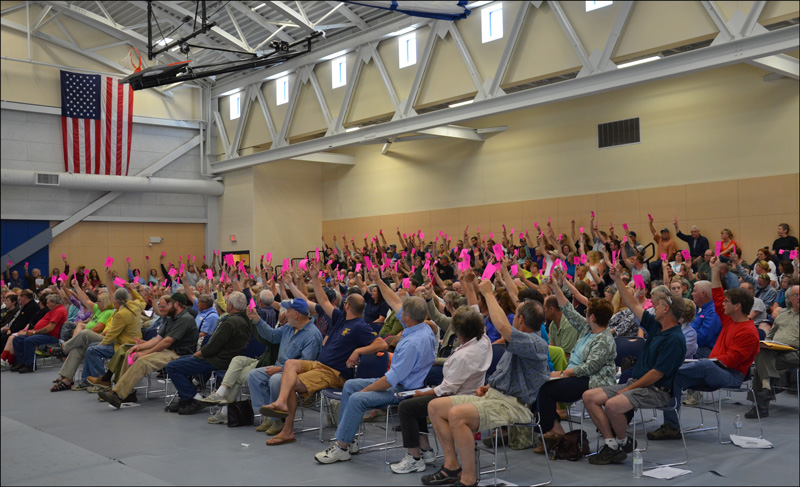 Raising their cards, casting their votes. (Lynda Clancy)
Raising their cards, casting their votes. (Lynda Clancy)
 Lincolnville Administrative Assistant Karen Secotte, tallies the pink cards. (Photo by Lynda Clancy)
Lincolnville Administrative Assistant Karen Secotte, tallies the pink cards. (Photo by Lynda Clancy)
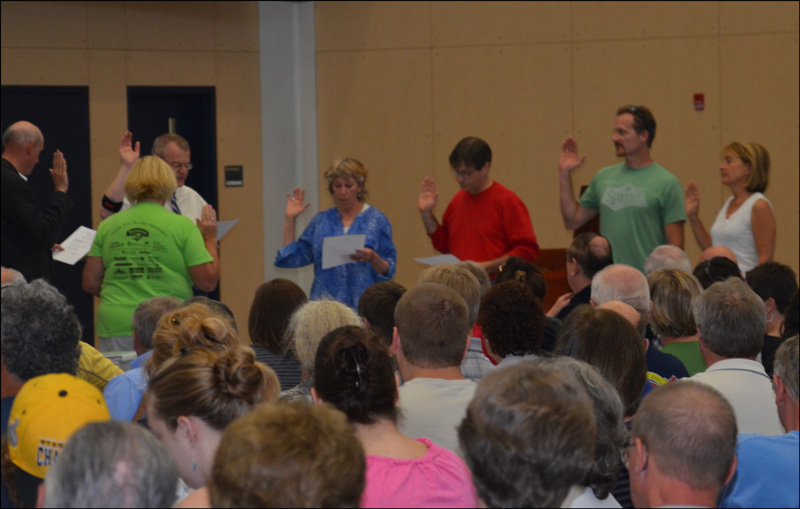 At the beginning of town meeting, elected selectmen and committee members are sworn in.
At the beginning of town meeting, elected selectmen and committee members are sworn in.
 Election wardens and volunteers check in residents and voters. Seated, Wallace and Diane O'Brien, Vicki Eugley and Lois Lyman. Standing is Christine Burstein.
Election wardens and volunteers check in residents and voters. Seated, Wallace and Diane O'Brien, Vicki Eugley and Lois Lyman. Standing is Christine Burstein.
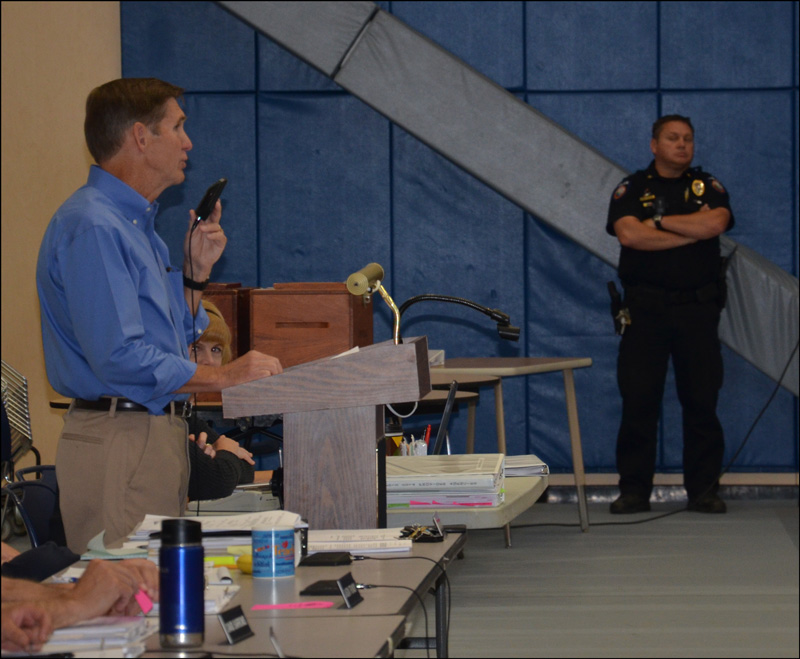 Town Meeting Moderator Rick McKittrick explains amendment to motions and how the electorate votes on them. (Photo by Lynda Clancy)
Town Meeting Moderator Rick McKittrick explains amendment to motions and how the electorate votes on them. (Photo by Lynda Clancy)
 It didn't matter which side of the police department issue one occupied, everyone was passionate about the outcome. (Photo by Lynda Clancy)
It didn't matter which side of the police department issue one occupied, everyone was passionate about the outcome. (Photo by Lynda Clancy)
 Bleachers were filled in the Lincolnville Central School gymnasium. (Photo by Lynda Clancy)
Bleachers were filled in the Lincolnville Central School gymnasium. (Photo by Lynda Clancy)
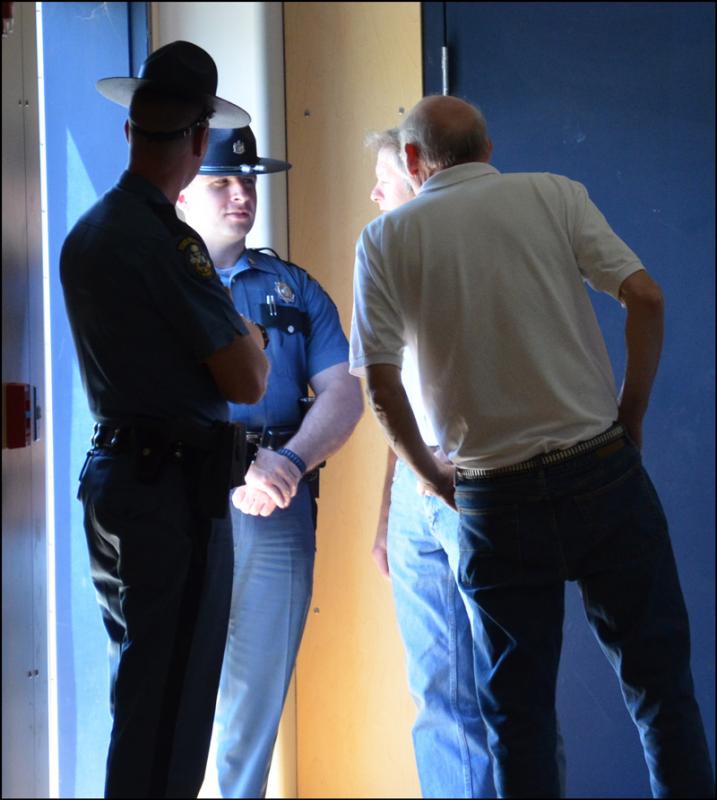 About halfway through the meeting, two state troopers stopped by to assess progress. (Photo by Lynda Clancy)
About halfway through the meeting, two state troopers stopped by to assess progress. (Photo by Lynda Clancy)
 Casting ballots into the wooden ballot box, and constant fixture at Lincolnville Town Meeting. (Photo by Lynda Clancy)
Casting ballots into the wooden ballot box, and constant fixture at Lincolnville Town Meeting. (Photo by Lynda Clancy)
 Hot pink was the color of the day at Lincolnville Town Meeting. (Photo by Lynda Clancy)
Hot pink was the color of the day at Lincolnville Town Meeting. (Photo by Lynda Clancy)
 Waiting to raise the card. (Photo by Lynda Clancy)
Waiting to raise the card. (Photo by Lynda Clancy)
 Lincolnville citizens use hot pink cards Saturday to indicate whether they wanted to keep its police department intact for $85,557. Ultimately, opposition to a local police force prevailed and the police chief's job eliminated. Police Chief Ron Young will remain on the job until the end of this month, per his contract. (Photo by Lynda Clancy)
Lincolnville citizens use hot pink cards Saturday to indicate whether they wanted to keep its police department intact for $85,557. Ultimately, opposition to a local police force prevailed and the police chief's job eliminated. Police Chief Ron Young will remain on the job until the end of this month, per his contract. (Photo by Lynda Clancy)
 Town Administrator David Kinney counts pink cards. (Photo by Lynda Clancy)
Town Administrator David Kinney counts pink cards. (Photo by Lynda Clancy)
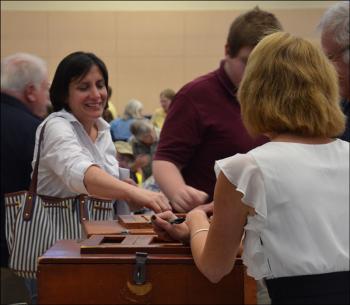 Lincolnville resident MaryAnne Mercier casts her ballot into the box.
Lincolnville resident MaryAnne Mercier casts her ballot into the box.
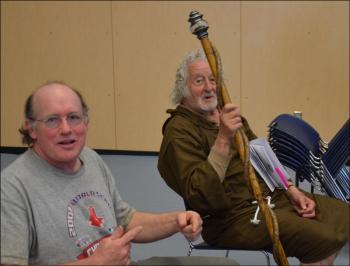 Lincolnville residents Mike Ray and Richard Rosenberg. (Photo by Lynda Clancy)
Lincolnville residents Mike Ray and Richard Rosenberg. (Photo by Lynda Clancy)
 Raising their cards, casting their votes. (Lynda Clancy)
Raising their cards, casting their votes. (Lynda Clancy)
 Lincolnville Administrative Assistant Karen Secotte, tallies the pink cards. (Photo by Lynda Clancy)
Lincolnville Administrative Assistant Karen Secotte, tallies the pink cards. (Photo by Lynda Clancy)
 At the beginning of town meeting, elected selectmen and committee members are sworn in.
At the beginning of town meeting, elected selectmen and committee members are sworn in.
 Election wardens and volunteers check in residents and voters. Seated, Wallace and Diane O'Brien, Vicki Eugley and Lois Lyman. Standing is Christine Burstein.
Election wardens and volunteers check in residents and voters. Seated, Wallace and Diane O'Brien, Vicki Eugley and Lois Lyman. Standing is Christine Burstein.
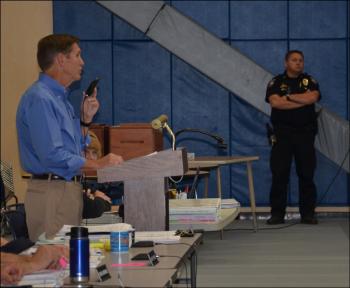 Town Meeting Moderator Rick McKittrick explains amendment to motions and how the electorate votes on them. (Photo by Lynda Clancy)
Town Meeting Moderator Rick McKittrick explains amendment to motions and how the electorate votes on them. (Photo by Lynda Clancy)
 It didn't matter which side of the police department issue one occupied, everyone was passionate about the outcome. (Photo by Lynda Clancy)
It didn't matter which side of the police department issue one occupied, everyone was passionate about the outcome. (Photo by Lynda Clancy)
 Bleachers were filled in the Lincolnville Central School gymnasium. (Photo by Lynda Clancy)
Bleachers were filled in the Lincolnville Central School gymnasium. (Photo by Lynda Clancy)
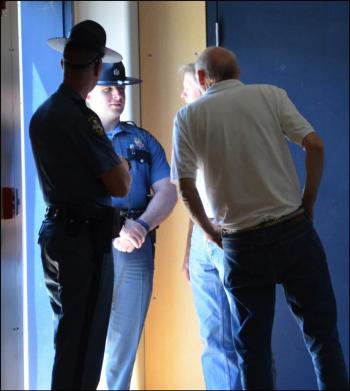 About halfway through the meeting, two state troopers stopped by to assess progress. (Photo by Lynda Clancy)
About halfway through the meeting, two state troopers stopped by to assess progress. (Photo by Lynda Clancy)
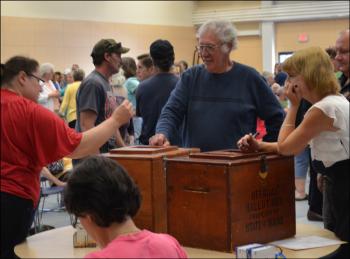 Casting ballots into the wooden ballot box, and constant fixture at Lincolnville Town Meeting. (Photo by Lynda Clancy)
Casting ballots into the wooden ballot box, and constant fixture at Lincolnville Town Meeting. (Photo by Lynda Clancy)
 Hot pink was the color of the day at Lincolnville Town Meeting. (Photo by Lynda Clancy)
Hot pink was the color of the day at Lincolnville Town Meeting. (Photo by Lynda Clancy)
 Waiting to raise the card. (Photo by Lynda Clancy)
Waiting to raise the card. (Photo by Lynda Clancy)
LINCOLNVILLE — Citizens turned out in droves on a beautiful June day to determine the fate of the Lincolnville Police Department, and as in years past, they split almost equally down lines endorsing or opposing its support. After more than three hours of debate, multiple motions made and hundreds of hot pink voting cards raised high overhead, the final vote was cast and at 187 to 163, the local police force was dissolved. That vote eliminated Chief Ron Young's job, the entire department and budgeting for any assets.
And that was just one article on a 35-article warrant that held voters engrossed for five hours in one of the oldest New England community traditions, annual town meeting. This one stands out in local history books for drawing out as many as three times more citizens than in past years. They arrived at Lincolnville Central School by 10 a.m. on June 15, standing in a registration line that snaked out the building and around the corner, as cars filled the parking lots or were lined up and down Route 235.
The mood was congenial, but as the morning slid into afternoon, and the town remained focused on Article 7, tempers got testy and Moderator Rick McKittrick warned hecklers they would be escorted out if outbursts were not restrained. It was democracy in its purest local form, mostly neighborly and respectful, sometimes mean and nasty.
By the end of meeting at 3 p.m., Lincolnville had cut $160,057 from its 2013-2014 budget: $85,557 from the police department line, $72,000 from ambulance service, and $2,500 that had been budgeted for acquisition of a new police cruiser. Citizens also debated cutting the service provider budget of $10,094 in half, but that motion failed. In the end, the town approved a $1.6 million municipal budget. They also transferred two parcels, both approximately 70 acres in size and abutting Ducktrap River, to the Maine Department of Inland Fisheries and Wildlife for conservation.
And, immediately following town meeting, the selectmen convened to elect a new chairman and vice chairman. They are Ladleah Dunn and Julia Libby, respectively.
Because of the crowd — 370-plus residents, children and observers — the meeting began at 10:30 a.m. Before launching into the meat of the reason that so many turned out for town meeting, Moderator Richard McKittrick outlined general rules and explained town meeting processes.
"In the 40 or 50 town meetings I've been to, I've never seen this many people at a town meeting," said McKittrick. "Who knew so many people would come out to talk about alewives on the Ducktrap River."
As he explained the process, he said: "I never want procedures to get in the way of fairness. I want to make sure everyone gets to say what they want to say."
McKittrick asked citizens if they would allow nonvoters to speak, and resident Rick McLaughlin responded, moving that they not be allowed to do so.
McKittrick pointed out that such a vote would prohibit the town attorney from talking, as well as representatives from provider agencies, who were present to answer voter questions. McLaughlin subsequently withdrew his motion.
Town Administrator David Kinney swore in the newly elected officials and committee members, who earned a round of applause for their service, and McKittrick then recognized former town clerk Doris Weed, who retired this past winter. That resulted in a standing ovation for Weed and her 27 years of service to the town.
"I just want to thank you," said town selectman Rosey Gerry. "You know everybody. Even though these ladies [town office staff] are learning, you know everybody here."
Then, it was time to tackle Article 7: "To see what sum the town will vote to raise and appropriate for law enforcement (Lincolnville Police Department)."
Just after the article was read and a motion made, thus opening discussion on the article, Resident Cathy Hardy rose and made the motion to fund zero dollars for law enforcement. This opened the debate.
Reasons for cutting funds for the police department were budgetary and philosophical. Opponents argued that a $85,577 police department was a fiscal strain on the taxpayers, especially for the unemployed, as well as senior citizens on fixed incomes. They said the police department, consisting this year of one full-time police chief after its part-time staff was eliminated at the 2012 Annual Town Meeting, was unnecessary for a small town with a low crime rate, especially with county and state law enforcement available.
Supporters, on the other hand, cited the safety and sense of security provided by having a responsive full-time police chief in town.
One by one, citizens filed to the podium to deliver their testimonies in favor of, or against, the expenditure. The town had, on June 11 at the polls, voted 392 to 335 to wanted to amend their town charter, allowing them the right to decide if the town wants to have a police department. The vote followed a campaign in town to convince citizens that the town charter governing law enforcement needed changing. The debate over whether the small town needs its own police department has been ongoing for years, since the fulltime police chief position was created. It was a debate that drew interest from around the county and state; two Maine State Troopers stopped by at one point to see how the town had voted.
Lincolnville's 2013 Annual Town Meeting Warrant
Hardy said she wanted the police department eliminated to keep taxes low. She cited the sum of uncollected 2011 and 2012 taxes of $660,000, and said when she was selectman, one of the "toughest and heartwrenching jobs is to hear property tax abatement requests. It is heart-wrenching to see our neighbors not able to pay taxes."
She produced figures that she said she and Town Administrator David Kinney tabulated prior to town meeting. She said it cost each Lincolnville homeowner approximately $41.16 per year to fund the police department, using a formula based on a home valued at $200,000. To that, she added the estimated $61.62 that Lincolnville property owners (using the same formula) to fund Waldo County Sheriff's Office. Together, she said a Lincolnville homeowner was paying $102 per year on law enforcement. Lincolnville, she said, paid $212,830 in 2012 fund its own police department, and its portion of the Waldo sheriff's office budget.
"It seems ridiculous for a town with low crime," she said, adding that animal control issues contributed the largest portion of calls that Police Chief Ron Young responded to in 2012.
She proposed using the money saved for town office renovations currently under way.
Lincolnville resident Michael Lund said, however, that a police presence was worth more than money expended.
"It is a principle," he said. "Every child, every senior citizen deserves to be protected and feel safe in their home. Twenty minutes response time [attributing that to average response from a Waldo County deputy] is not sufficient."
Referencing the school shootings in Newtown, Conn., he proposed keeping the police chief employed, even increasing the budget to 2011 levels, when the town also budgeted for 30 hours-a-week part-time police officers to fill gaps when Young was not on duty.
Lincolnville resident Elizabeth Hand said she was self-employed, and often had hardship in meeting taxes.
"I believe, however, spending $102 on police is well worth it," she said.
Municipalities are cutting back on their police forces all over the country, and in every community that did, real estate values dropped 13 t o15 percent, she said, citing a real estate study.
Resident Joe McLaughlin said: "With the whole Newtown thing, no matter if we had chief in town, or sheriff's department, they are still far away. The only thing that will stop an a shooting is to have trained people carry weapons at school. I just wanted to bring that point up.”
Carol Hallenbeck, a county policy developer, said the Lincolnville Police Chief is one of the brass tacks, an "indispensible colleague at local and county levels. His seasoned presence makes for a great community."
Waldo County has the highest rate of prescription drug misuse in the state, she said, and many children have their first drink at age nine, and try marijuana at age 11. Pot-smoking surpasses cigarettes, she said. "It is easier to get."
It is not the job of teachers to keep drugs out of school, she said. "It is the job of law enforcement. Lincolnville School is one of the top in the state, and Young is a pillar of the community. It has everything to do with presence. Young is a prevention measure."
Lund made an amendment to the original motion, asking the town spend $130,000 and restore funding to the police department to the 2011 levels, when the department had a fulltime chief and 30 hours a week targeted for part-time police coverage. That failed in a hand count of 85 in favor, 130 opposed.
That returned the debate to original motion of a zero-dollar department funding.
Another motion was made to fund the department to $85,557.
The debate paused for a bit as Greg Boetsch wanted to clarify how many motions were on the floor. McKittrick responded that there was one motion, to approve $85,700 on the police department, and then an amendment to that motion, to fund zero dollars toward the department. He said the amended motion had be disposed of before the principal motion could be voted on.
A third motion would be confusing, he said.
EMS service funded $5,000
Instead of funding the town's ambulance service the recommended $77,000, citizens voted to expend $5,000 on Article 9.
Cathy Hardy made the motion to cut that line, and discussion followed. The article reflected the year-long downward fiscal slide of Camden First Aid Association, which for 77 years, has provided local ambulance service.
The $77,000
"The $5,000 is what North East Mobile Health Services asked and this would save the town $72,000. She asked whether North East would be ready to assume responsibilities July 1, after Camden First Aid Association's contract ends June 30.
Town Administrator Kinney said the four towns had been assured that North East would be ready by July 1.
Julia Libby, Service Chief at Camden First Aid, and who is a Lincolnville selectman, said "North East is clearly not ready to go July 1."
She said she had met with North East on Friday and was asked that Camden First Aid continue for a month. But Libby said Camden First Aid had no money to cover expenses, even though the Town of Camden offered to cover payroll for a month.
She said it costs $90,000 a month to run Camden First Aid. Libby said there was talk of call-sharing for the month of July, but it depended on staffing, "because some staff is looking for other jobs."
Mike Ray said that the town was asked to pay $5,000 but no contract existed yet between Lincolnville and North East. He said North East had no mutual aid agreement.
Kinney responded that it was not a hollow vote, and that North East had specified in its bid a specific set of services. He said the matter would be on the June 24 selectmen's agenda.
Dennis Simmons, Northeast Division Manager in the Rockport base, said a transition team is in place and said, "there will be no lapse in service." He said the company would move resources up from its base in Scarborough.
Richard McLaughlin thanked Libby for her 30 years of service.
"Julia, we have certainly appreciated your effort," he said. That statement was followed by a standing ovation for Libby.
"I've enjoyed the 30 years," she said, even the sleepless nights responding to emergencies throughout the region. But, she laughed, the 2 a.m. calls are now over. "I've reached a point in my life that I really don't care if you are sick."
Elizabeth Hand asked if any difference in service would be anticipated in the coming month.
Kinney, who has been working with the three other town administrators/managers of Hope, Camden and Rockport on the EMS service issue, said he could no speculate on that, and said he did not know of Friday's meeting, nor was invited.
Libby said the extracation equipment used when responding to car accidents will be transferred to Lincolnville Fire Department, and the volunteer team, which formerly worked in collaboration with Camden First Aid, has an agreement to respond to accidents in Rockport and Hope.
Kinney said Camden recently purchased its own extracation equipment and will respond to accidents by mutual aid arrangement.
Matthew Silverio, a member of the high terrain rescue team, which helps climbers and others in outdoor emergencies, said that team operated wholly on volunteer effort. Camden First Aid had graciously allowed the team to keep its equipment at the Camden facility, and no matter where the team went, "If you get stuck in Lincolnville, we'd be happy to come get you."
Resident Christi Hardy Gilson said she opposed the expenditure and said she, "felt safe every single day. My children have felt safe in their school and community."
She said there was a string of burglaries in town a few years ago, and perpetrators showed up at her house, when her teens were home alone. Local police were unavailable, she said.
"Waldo County responded to house, and justice was served," she said. "With that incident, I still felt Waldo County was the place to go."
She said the exception was animal control, and said Lincolnville Police Department responded when bunnies were dumped in the graveyard across the street from her home, and again when a raccoon was in a nearby tree. Police were "professional and remedied the problem. I'm not being sarcastic, but we don't need $85,000 for animal control."
She suggested that a school resource officer would be more cost effective and best placed in school budget.
Resident Jean Botley said Young, "may only get paid 40 hours a week, but he rarely works less than 10 hours a day.... It is not just job, but large part of his life. This is his community, and he makes it his community."
Richard McLaughlin said the money dedicated for the town's police department "might be well spent if we put into resource protection in school."
Resident Robert Plausse said, "There is nothing that is going to take place of local police presence. It's not the money, it's a philosophy."
Ernest Littlefield, who served for 15 years as a selectman and was one of the original proponents of establishing a police department, said coverage by Lincolnville police was not good in his part of town on Megunticook Lake near the Camden town line, especially after 5 p.m. In the event of an accident, the fire department responds, he said, or Camden responds "until someone comes to take over, either state or county."
Christina Barrows said: "I want to keep the police. Lincolnville has responded to five incidents in may family, and Ron has been there in five minutes. Waldo and state are reactive, no proactive, they can't be there."
By then, the crowd was beginning to get antsy.
“Move the question," shouted some in the bleachers.
McKittrick called for order, sternly warned one persistent heckler, and then asked the town if it wanted to limit the debate. The entire gymnasium voted in favor of that motion, with but five opposing.
Another motion was then made to call the question.
Kathleen Oliver made a motion to amend Hardy's amendment to expend $85,557, a motion that took the question back to the original article.
But McKittrick and the town's attorney both said voters could not stack amendments on top of amendments.
However, they could amend articles, a propose dollar amounts, "until town meeting voters decide they don't want to amend it any more," said the town attorney.
McKittrick called for a hand vote on Oliver's amendment, and as hot pink cards were raised, town staff counted 182 to 181 in favor of the expenditure.
Hardy then made a motion the same question be moved to a secret ballot, given the close result. Town Administrator David Kinney seconded that motion.
With that, the voters stepped down off the bleachers and out of their chairs to line up and check again with town staff to validate their voter registration. They filled out their ballots, dropped them one by one into the wooden box that was monitored by election wardens, and then took a break while the ballots were counted. Some residents left town meeting altogether.
Oliver's amendment failed at 189 to 186, and then it was back to Hardy's original amendment to apply zero dollars to the police department.
But first, the town collectively voted to end debate on the police department matter. And, citizens decided they did not want to file again through a secret ballot process. All seemed to agree that they weren't, at that point, bound to change their minds on the issue; nor did they care who saw them voting their position.
Pink cards were raised again, and after the final count was made, the motion to fund the department at zero dollars prevailed, 187 to 163.
Following that vote, they overwhelmingly approved the next warrant article to spend $39,000 to fulfill the town's statutory and employment contract obligations with Chief Young.
Winding up business in a flash
Growing impatient with the last third of the warrant, the townspeople left in the gymnasium at 2 p.m. voted in favor of dispensing 11 remaining articles in one fell swoop. The motion was made to approve articles 23 through 34, most of them annual municipal housekeeping articles, such as setting annual interest rates for unpaid property taxes (7 percent), authorizing selectmen to close roads as needed, and disposing of town-owned property valued at less than $1,000.
The town also agreed at the end of the meeting to sell two parcels of land, one 69 acres in size, the other 70 acres, to the State of Maine and its Department of Inland Fisheries and Wildlife. Both parcels abut the Ducktrap River and are to be placed in conservation.
Editorial Director Lynda Clancy can be reached at lyndaclancy@penbaypilot.com; 706-6657.
Event Date
Address
United States




